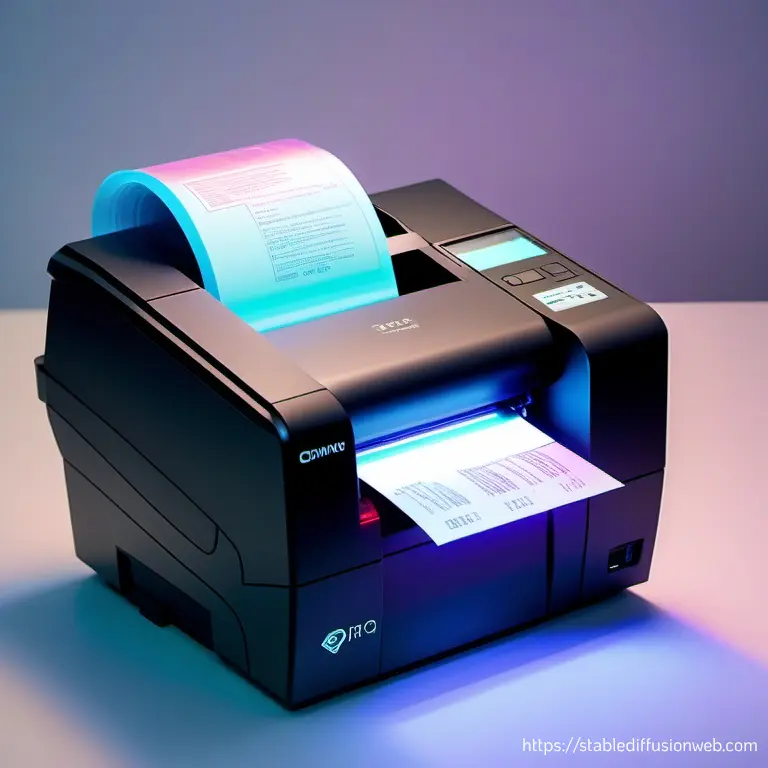
In the fast-paced world of Fast-Moving Consumer Goods (FMCG), efficiency is key. With products flying off the shelves and supply chains operating at lightning speed, businesses rely on solutions that streamline operations. One of the unsung heroes of this sector is thermal paper—a versatile and cost-effective material that enhances everything from inventory management to customer experience.
The Role of Thermal Paper in FMCG
Thermal paper is indispensable in the Fast-Moving Consumer Goods (FMCG) sector, playing a crucial role in ensuring smooth and efficient operations. From product labeling to logistics and promotional materials, thermal paper supports the fast-paced environment of FMCG businesses in multiple ways. Below is a detailed exploration of its key applications.
Labeling and Barcoding
In the FMCG industry, product identification is critical. Thermal paper is a preferred choice for printing labels and barcodes due to its precision and durability. Whether it’s price tags on store shelves or batch tracking labels in warehouses, thermal paper ensures that all essential information is printed clearly and remains readable over time.
Its smudge-resistant and reliable nature makes it suitable for various conditions, including cold storage and transportation. For businesses seeking dependable solutions, thermal paper offers a seamless way to maintain inventory accuracy and product traceability, contributing to operational efficiency.
High-quality options such as those in our Thermal Paper Collection are tailored to meet these demands, ensuring durability and precision in every use case.
Point-of-Sale Applications
The checkout experience is a critical touchpoint in the FMCG sector, and thermal paper plays a vital role in ensuring its smooth operation. Thermal printers at checkout counters generate clear, smudge-free receipts in seconds, allowing businesses to process transactions quickly, even during peak hours.
This speed and clarity not only enhance the operational efficiency of retail outlets but also improve customer satisfaction. A crisp, legible receipt can leave a positive impression on customers, strengthening brand perception.
At Stingbull Ribbon, we provide thermal paper ideal for Point-of-Sale (POS) systems, ensuring businesses can maintain their fast-paced operations while delivering high-quality customer experiences.
Packaging and Logistics
The FMCG supply chain is a complex and fast-moving network that relies heavily on accurate tracking and labeling. Thermal paper is extensively used for shipping labels, product identification, and expiry date tags. These labels are crucial for maintaining product safety, streamlining logistics, and reducing errors during transit.
Thermal paper’s ability to withstand various environmental conditions, such as humidity and temperature changes, makes it ideal for FMCG packaging. Whether used for perishable goods requiring refrigeration or dry goods in long-haul shipping, thermal paper ensures the integrity of labeling information throughout the supply chain.
Its role in logistics extends beyond just labels—it supports the entire lifecycle of goods from manufacturing to retail shelves, ensuring traceability and compliance with industry standards.

Promotional Materials
Thermal paper is also a key player in driving customer engagement in the FMCG sector. Coupons, discount vouchers, and promotional codes printed on thermal paper are cost-effective tools for boosting sales and increasing customer loyalty.
The lightweight and compact nature of thermal paper make it easy to include in product packaging, mailers, or even as add-ons at checkout counters. Businesses can design visually appealing promotional materials that are both budget-friendly and impactful, helping to create memorable marketing campaigns.
By utilizing thermal paper for promotions, brands can target customers effectively while staying within their budget. It offers an efficient way to engage consumers and encourage repeat purchases, solidifying the brand’s position in a competitive market.
Thermal paper’s versatility and reliability across these applications make it a cornerstone of the FMCG industry. Whether it’s ensuring operational efficiency, enhancing customer experience, or driving promotional campaigns, thermal paper proves to be an essential component of success.
Benefits of Using Thermal Paper in FMCG
Thermal paper provides numerous advantages that make it a vital resource for the fast-paced and demanding FMCG sector. Its unique qualities allow businesses to optimize operations, reduce costs, and meet modern sustainability standards. Here is an in-depth look at its key benefits:
Cost-Effectiveness
Thermal printers, unlike traditional printers, do not require ink cartridges, toner, or ribbons, significantly reducing operational expenses. The absence of these consumables not only minimizes maintenance costs but also simplifies the overall printing process.
This cost-saving feature is particularly beneficial in the FMCG industry, where high-volume printing is a daily requirement. Businesses can print receipts, labels, and barcodes in bulk without worrying about frequent replenishment of printing supplies, enabling more efficient budgeting and resource allocation.
By investing in thermal paper and printers, FMCG companies can achieve long-term savings while maintaining the quality and consistency of printed materials.
High-Speed Printing
In the FMCG world, speed is everything. Thermal printers are renowned for their rapid printing capabilities, making them perfect for environments with high demand and tight timelines. Whether printing product labels, shipping details, or customer receipts, thermal paper ensures the process is completed quickly without compromising clarity.
This speed advantage is especially critical in retail stores and warehouses, where delays can disrupt workflows and impact customer satisfaction. With thermal paper, businesses can maintain a steady pace of operations, reducing wait times for both employees and consumers.
Eco-Friendly Options
As sustainability becomes a priority across industries, thermal paper manufacturers have developed environmentally friendly options to meet growing eco-conscious demands. BPA-free thermal paper is a popular choice for businesses looking to reduce their environmental impact.
This type of paper is free from harmful chemicals, making it safer for both users and the environment. Additionally, many thermal paper products are recyclable, contributing to waste reduction and supporting corporate sustainability goals.
For FMCG companies committed to going green, adopting eco-friendly thermal paper options demonstrates responsibility while maintaining operational efficiency. These choices align with consumer preferences for sustainable practices, enhancing brand reputation in the process.
Durability
Thermal paper is known for its ability to withstand wear and tear, making it highly reliable for the FMCG sector. Whether exposed to fluctuating temperatures, humidity, or heavy handling during transportation, thermal paper retains its clarity and legibility.
This durability is particularly valuable in scenarios where labels and receipts need to remain intact over time. For example, shipping labels must stay readable throughout transit, and product labels must endure varying storage conditions. Thermal paper’s resilience ensures critical information is preserved, reducing the risk of errors and enhancing operational reliability.
The durability of thermal paper also extends to promotional materials, such as coupons or vouchers, which must remain presentable and usable until redeemed. This reliability contributes to a seamless customer experience and boosts consumer trust.
Enhanced Operational Efficiency
When combining these benefits—cost savings, speed, sustainability, and durability—thermal paper becomes an indispensable tool for optimizing operations in the FMCG sector. By using thermal paper, businesses can streamline workflows, minimize errors, and meet customer expectations with ease.
In a competitive industry where every second and penny counts, the adoption of thermal paper offers a strategic advantage that supports both profitability and environmental responsibility.
Innovations in Thermal Paper
The FMCG industry is constantly evolving, and thermal paper has kept pace by embracing advancements that meet the needs of modern businesses. With growing concerns about environmental sustainability and operational efficiency, the thermal paper industry has introduced groundbreaking innovations. These developments not only enhance functionality but also align with the global push for eco-friendly solutions.
Biodegradable and Eco-Friendly Thermal Paper

As FMCG companies prioritize sustainability, biodegradable thermal paper has emerged as a game-changer. This innovative material is designed to break down naturally without leaving harmful residues, making it a responsible choice for businesses aiming to reduce their environmental footprint.
In addition, BPA-free thermal paper is now widely available, addressing health and ecological concerns associated with traditional thermal paper. BPA-free options maintain the same high-quality performance while ensuring safety for users and the environment. These advancements enable businesses to meet stringent environmental standards and appeal to eco-conscious consumers.
Adopting such sustainable alternatives not only supports green initiatives but also enhances brand reputation, demonstrating a commitment to corporate social responsibility.
Integration with Smart Technologies
Another exciting development in thermal paper is its integration with smart technologies like RFID (Radio-Frequency Identification) and NFC (Near Field Communication) tags. These technologies transform thermal paper into more than just a printing medium—they turn it into a tool for advanced inventory management and product traceability.
RFID-enabled thermal labels allow businesses to track products throughout the supply chain with remarkable accuracy. This technology provides real-time data on stock levels, movement, and location, minimizing errors and improving operational efficiency.
Similarly, NFC tags integrated into thermal paper can store detailed product information, such as expiry dates, manufacturing details, and promotional offers. Consumers can access this data instantly with a smartphone, enhancing transparency and engagement.
These innovations streamline logistics, improve customer experience, and reduce waste by ensuring accurate and efficient tracking of goods.
Thermal Paper for Smart Packaging
The rise of smart packaging in FMCG has also driven demand for innovative thermal paper solutions. Smart packaging leverages thermal paper for dynamic printing, such as temperature-sensitive labels that indicate freshness or color-changing labels that alert consumers to product conditions.
These features are particularly beneficial for perishable goods, ensuring quality and safety throughout the product’s lifecycle. This application adds value for both businesses and customers, helping to build trust and loyalty.
Future-Ready Solutions for FMCG
The thermal paper industry is continually exploring ways to combine sustainability with technology. Future innovations are likely to include even more advanced materials, such as compostable thermal paper, and greater compatibility with IoT (Internet of Things) devices for seamless automation in the FMCG supply chain.
With a focus on efficiency, transparency, and environmental responsibility, these innovations position thermal paper as a vital component in the evolution of the FMCG industry. Businesses seeking to stay ahead can explore cutting-edge solutions in our Thermal Paper Collection, designed to meet the demands of modern commerce while supporting sustainability goals.
Future Trends in FMCG and Thermal Paper
The FMCG sector is undergoing rapid transformation, driven by shifting consumer preferences, technological advancements, and increasing sustainability requirements. Thermal paper, as a cornerstone of operational efficiency in FMCG, continues to evolve to meet these new demands. Below are some key trends shaping the future of thermal paper in this dynamic industry.
The Rise of E-Commerce Packaging
The explosive growth of e-commerce has revolutionized the way FMCG companies operate. With more products being shipped directly to consumers, the need for reliable and efficient shipping labels has soared. Thermal paper is at the forefront of this trend, offering quick, cost-effective, and durable printing solutions for shipping labels that must endure various handling and environmental conditions.
These labels ensure packages are accurately tracked and delivered, minimizing errors and enhancing customer satisfaction. Additionally, the rise of same-day and next-day delivery services places even greater emphasis on the need for high-speed printing solutions that thermal paper can provide.
Businesses that invest in advanced thermal paper products can meet these demands while keeping costs under control, ensuring smooth operations in a competitive e-commerce landscape.
Smart Thermal Solutions for Automation
Automation is a defining trend in the FMCG sector, and thermal paper is playing a vital role in this evolution. Smart thermal solutions integrated with technologies like RFID (Radio-Frequency Identification) and IoT (Internet of Things) are transforming inventory and tracking systems.
RFID-enabled thermal paper allows businesses to automate the tracking of products through the supply chain, providing real-time updates on stock levels, shipment status, and storage conditions. This reduces manual errors, improves efficiency, and enhances supply chain visibility.
Thermal paper is also being used in automated checkout systems, where receipts and labels are printed on-demand to streamline customer transactions. These advancements align with the growing need for speed and accuracy in FMCG operations, helping businesses remain competitive and responsive to market demands.
Sustainable Thermal Paper Options
Environmental sustainability is no longer optional—it is an essential part of doing business in today’s FMCG market. Consumers and regulatory bodies alike are demanding that companies adopt eco-friendly practices. In response, the thermal paper industry has developed innovative solutions that prioritize sustainability without compromising quality.
Biodegradable and BPA-free thermal paper options are becoming the standard, enabling businesses to reduce their environmental footprint. These papers are designed to decompose naturally or be recycled, ensuring minimal impact on the environment.
FMCG brands are increasingly integrating these sustainable options into their operations, aligning with global efforts to combat climate change and reduce waste. Choosing environmentally friendly thermal paper not only fulfills corporate social responsibility goals but also resonates with eco-conscious consumers, enhancing brand loyalty.

Looking Ahead: Innovations on the Horizon
As the FMCG sector continues to evolve, thermal paper is poised to embrace even more advancements. Future innovations may include:
Compostable thermal paper that further enhances sustainability.
Thermal paper with built-in digital capabilities for enhanced interactivity, such as QR codes for product information or loyalty programs.
Advanced anti-counterfeiting features for high-value or sensitive FMCG products.
These developments will enable businesses to meet the challenges of an increasingly complex market while delivering superior customer experiences and achieving sustainability targets.
At Stingbull Ribbon, we are committed to offering solutions that align with these emerging trends. Our comprehensive range of thermal paper products is designed to help FMCG businesses stay ahead of the curve, ensuring they are equipped for the future while meeting today’s demands.
Conclusion
From product labeling to logistics and customer receipts, thermal paper is a cornerstone of the FMCG industry. Its cost-effectiveness, reliability, and adaptability make it an essential resource for businesses operating in this fast-paced sector.
To explore thermal paper solutions tailored for FMCG, visit our Thermal Paper Collection. Whether you’re enhancing your supply chain or elevating customer experience, our products are designed to meet your needs efficiently and sustainably.
